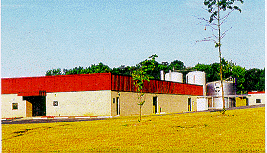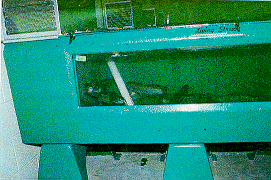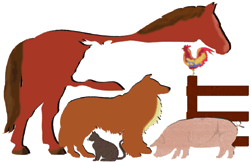

Center for Veterinary Medicine
U.S. Food and Drug Administration
Aquaculture
CVM DEVOTING RESOURCES AND EXPERTISE TO AQUACULTURE
 Aquaculture is becoming an increasingly important source of fish available for human consumption. As the number of aquaculture facilities grows, so does the need to develop safe and effective drugs for treating fish diseases. In response to this, the FDA's Center for Veterinary Medicine (CVM) Office of Research (OR) has greatly expanded its commitment to aquaculture research.
Aquaculture is becoming an increasingly important source of fish available for human consumption. As the number of aquaculture facilities grows, so does the need to develop safe and effective drugs for treating fish diseases. In response to this, the FDA's Center for Veterinary Medicine (CVM) Office of Research (OR) has greatly expanded its commitment to aquaculture research.
Dr. Renate Reimschuessel directs CVM's aquaculture research in a new state-of-the-art facility located in Laurel, MD. There are four main research rooms totaling approximately 4,600 sq. ft., one radioisotope fish lab of 600 sq. ft., a storage room, two mechanical/filtration rooms and two support rooms. Incoming water from either the well or municipal supply goes into the primary filtration system comprised of separate calcite and carbon contactors. Temperature is controlled by separate heat exchangers and chillers, which provide hot and cold running water to mixing valves at the fish tanks. A centralized computer system monitors the flow-through water system temperature and pH. Outside the building is a 25,000 gal. water storage tank with venturi systems to remove carbon dioxide from the well water. Wastewater is sent to either two 20,000 gal. "clean" water holding tanks or two 10,000 gal. radioactive wastewater holding tanks.
 Research at the facility will focus on both regulatory priorities and the needs of the aquaculture community. Species that will be studied initially include tilapia (Oreochromis sp.), rainbow trout (Oncorhynchus mykiss), Atlantic salmon (Salmo salar), channel catfish (Ictalurus punctatus), large mouth bass (Micropterus salmoides), toadfish (Opsanus tau), and goldfish (Carassius auratus). All of these species, except goldfish, are currently raised or maintained for food purposes. Goldfish will serve as a model for ornamental fish and as a disease model.
Research at the facility will focus on both regulatory priorities and the needs of the aquaculture community. Species that will be studied initially include tilapia (Oreochromis sp.), rainbow trout (Oncorhynchus mykiss), Atlantic salmon (Salmo salar), channel catfish (Ictalurus punctatus), large mouth bass (Micropterus salmoides), toadfish (Opsanus tau), and goldfish (Carassius auratus). All of these species, except goldfish, are currently raised or maintained for food purposes. Goldfish will serve as a model for ornamental fish and as a disease model.
 Research objectives are designed to provide data to assist the Food and Drug Administration in assuring that fish derived from the aquaculture production environment are safe for human consumption. Priorities include studying the biodistribution, residue persistence, metabolism, efficacy, and environmental effects of drugs and other chemicals used in aquaculture. There will be a large effort to develop a rationale for crop grouping (grouping species for drug approvals based on similarities in anatomy, physiology, and drug metabolism). Other studies are designed to investigate the effect of drugs on the environment, non-target species, and the pathogens associated with aquatic species. Of increasing importance are studies designed to understand the development and transmission of antimicrobial resistance in both pathogens and environmental microbes.
Research objectives are designed to provide data to assist the Food and Drug Administration in assuring that fish derived from the aquaculture production environment are safe for human consumption. Priorities include studying the biodistribution, residue persistence, metabolism, efficacy, and environmental effects of drugs and other chemicals used in aquaculture. There will be a large effort to develop a rationale for crop grouping (grouping species for drug approvals based on similarities in anatomy, physiology, and drug metabolism). Other studies are designed to investigate the effect of drugs on the environment, non-target species, and the pathogens associated with aquatic species. Of increasing importance are studies designed to understand the development and transmission of antimicrobial resistance in both pathogens and environmental microbes.
 Dr. Reimschuessel is actively collaborating with scientists conducting aquaculture-related research at the University of Maryland, Johns Hopkins University, Fort Detrick, and the Maryland Department of Natural Resources. She will be developing a research internship program at CVM for fourth-year veterinary students interested in aquaculture to expand veterinary involvement in fish medicine and research. These programs are designed to educate veterinarians about aquatic species and will help increase correct diagnosis and treatment of diseases. This in turn should reduce arbitrary or inappropriate use of therapeutic agents in farm-raised fish.
Dr. Reimschuessel is actively collaborating with scientists conducting aquaculture-related research at the University of Maryland, Johns Hopkins University, Fort Detrick, and the Maryland Department of Natural Resources. She will be developing a research internship program at CVM for fourth-year veterinary students interested in aquaculture to expand veterinary involvement in fish medicine and research. These programs are designed to educate veterinarians about aquatic species and will help increase correct diagnosis and treatment of diseases. This in turn should reduce arbitrary or inappropriate use of therapeutic agents in farm-raised fish.
Contacts for Information
Office of Research
Center for Veterinary Medicine
Food and Drug Administration
8401 Muirkirk Road
Laurel, Maryland 20708
Dr. Renate Reimschuessel
Research Biologist - Aquaculture
(301) 827-8025
Dr. Norris E. Alderson
Director, Office of Research
301-827-8010
Mr. Michael H. Thomas
Director, Division of Residue Chemistry
301-827-8167
Dr. Russell A. Frobish
Director, Division of Animal Research
301-827-8010
Dr. Robert D. Walker
Director, Division of Animal and Food Microbiology
(301) 827-8019
Dr. David B. Batson
Extramural Programs
301-827-8021
